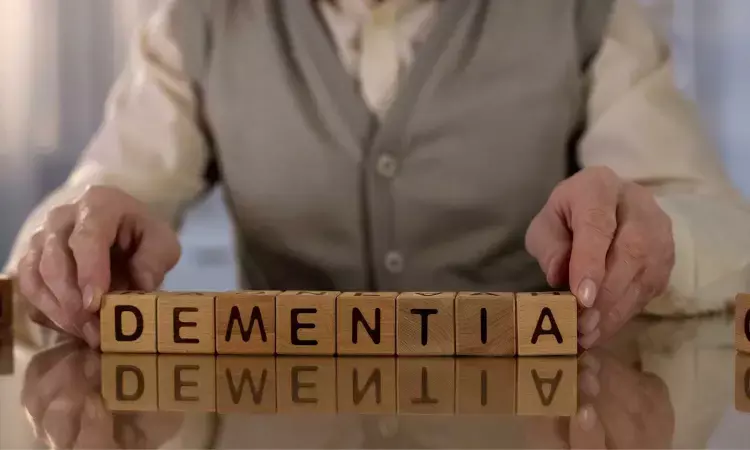- Home
- Medical news & Guidelines
- Anesthesiology
- Cardiology and CTVS
- Critical Care
- Dentistry
- Dermatology
- Diabetes and Endocrinology
- ENT
- Gastroenterology
- Medicine
- Nephrology
- Neurology
- Obstretics-Gynaecology
- Oncology
- Ophthalmology
- Orthopaedics
- Pediatrics-Neonatology
- Psychiatry
- Pulmonology
- Radiology
- Surgery
- Urology
- Laboratory Medicine
- Diet
- Nursing
- Paramedical
- Physiotherapy
- Health news
- Fact Check
- Bone Health Fact Check
- Brain Health Fact Check
- Cancer Related Fact Check
- Child Care Fact Check
- Dental and oral health fact check
- Diabetes and metabolic health fact check
- Diet and Nutrition Fact Check
- Eye and ENT Care Fact Check
- Fitness fact check
- Gut health fact check
- Heart health fact check
- Kidney health fact check
- Medical education fact check
- Men's health fact check
- Respiratory fact check
- Skin and hair care fact check
- Vaccine and Immunization fact check
- Women's health fact check
- AYUSH
- State News
- Andaman and Nicobar Islands
- Andhra Pradesh
- Arunachal Pradesh
- Assam
- Bihar
- Chandigarh
- Chattisgarh
- Dadra and Nagar Haveli
- Daman and Diu
- Delhi
- Goa
- Gujarat
- Haryana
- Himachal Pradesh
- Jammu & Kashmir
- Jharkhand
- Karnataka
- Kerala
- Ladakh
- Lakshadweep
- Madhya Pradesh
- Maharashtra
- Manipur
- Meghalaya
- Mizoram
- Nagaland
- Odisha
- Puducherry
- Punjab
- Rajasthan
- Sikkim
- Tamil Nadu
- Telangana
- Tripura
- Uttar Pradesh
- Uttrakhand
- West Bengal
- Medical Education
- Industry
Nerve pain drug gabapentin linked to increased dementia, cognitive impairment risks: Study

Receiving six or more prescriptions of the drug gabapentin for low back pain is associated with significantly increased risks of developing dementia and mild cognitive impairment (MCI)--29% and 85%, respectively-finds a large medical records study published online in the journal Regional Anesthesia & Pain Medicine.
What’s more, these risks were more than twice as high in those normally considered too young to develop either condition-18-64 year olds-the findings indicate.
Unlike opioids, gabapentin has relatively low addictive potential, and it has become increasingly popular for the treatment of chronic pain, especially neuropathic pain, as it offers potentially neuroprotective benefits, point out the researchers.
But concerns are beginning to emerge about its side effects, including a possible association with neurodegeneration, although the findings to date have been mixed, including if particular age groups might be more vulnerable they add.
In a bid to shed more light on these issues, the researchers drew on real-time data from TriNetX, a federated health research network, which contains electronic health records from 68 healthcare organisations across the USA.
They scrutinised the anonymised records of adult patients who had and hadn’t been prescribed gabapentin (26,414 in each group) for chronic low pain between 2004 and 2024, taking account of demographics, co-existing conditions, and the use of other analgesic drugs.
Those who had received six or more gabapentin prescriptions were 29% more likely to be diagnosed with dementia and 85% more likely to be diagnosed with MCI within 10 years of their initial pain diagnosis.
And when the records were stratified by age, 18–64 year olds prescribed the drug were more than twice as likely to develop either condition than those who hadn’t been prescribed gabapentin.
While there was no heightened risk among 18–34 year olds prescribed the drug, the risks of dementia more than doubled and those of MCI more than tripled among 35–49 year olds prescribed it. A similar pattern was observed among 50–64 year olds.
Risks also rose in tandem with prescription frequency: patients with 12 or more prescriptions were 40% more likely to develop dementia and 65% more likely to develop MCI than those prescribed gabapentin between 3 and 11 times.
This is an observational study, and as such, no firm conclusions can be drawn about cause and effect. The researchers also acknowledge that their study was retrospective, and they weren’t able to account for dose or length of gabapentin use.
Nevertheless, they conclude: “Our findings indicate an association between gabapentin prescription and dementia or cognitive impairment within 10 years. Moreover, increased gabapentin prescription frequency correlated with dementia incidence.”
They add: “Our results support the need for close monitoring of adult patients prescribed gabapentin to assess for potential cognitive decline.”
Reference:
Risk of dementia following gabapentin prescription in chronic low back pain patients, Regional Anesthesia & Pain Medicine (2025). DOI: 10.1136/rapm-2025-106577
Dr Kamal Kant Kohli-MBBS, DTCD- a chest specialist with more than 30 years of practice and a flair for writing clinical articles, Dr Kamal Kant Kohli joined Medical Dialogues as a Chief Editor of Medical News. Besides writing articles, as an editor, he proofreads and verifies all the medical content published on Medical Dialogues including those coming from journals, studies,medical conferences,guidelines etc. Email: drkohli@medicaldialogues.in. Contact no. 011-43720751


